Thursday, February 16, 2012
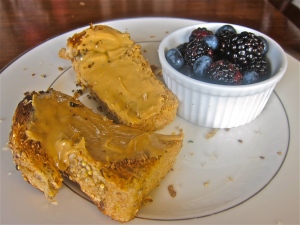 Happy Belated Peanut Butter and Jelly Day! (And thanks to Foodimentary for bringing this holiday to my attention.)
Happy Belated Peanut Butter and Jelly Day! (And thanks to Foodimentary for bringing this holiday to my attention.)
An odd follow up to lobster bisque for my regular readers, I know. However, I’ve actually been meaning to write about peanut butter for quite some time now, so this week seemed the perfect week to do so. In addition to its national recognition, I also stumbled upon another peanut butter shout out on the Bon Appétit food blog, where the new editor Adam Rapoport discussed his regular breakfast of grumpy red eyes and chunky peanut butter on whole grain toast.
Why peanut butter?
I love peanut butter. Not like I love divine lobster bisque or decadent chocolate brownies, of course, which are infrequent treats that are not a part of my usual diet. On the other hand, peanut butter is creamy, delicious, satisfying, and good for you, so it actually can be a part of your regular repertoire. An almost-daily pleasure for me. I even keep a jar at my office alongside a loaf of whole grain bread, and peanut butter on toast is a frequent late morning breakfast or early afternoon snack at work. Incidentally, I recently learned that my colleagues and research assistants apparently find my affection for peanut butter on toast rather amusing. Yes it’s true, you might often hear me say “Wait, I just need to make myself a piece of toast!” if you try to drag me into a mind-numbing meeting, but I still fail to see why this is funny. It’s not like I’m neurotic about it or anything placing exactly one piece of bread in the toaster until it’s the perfect level of crisp brownness, lovingly spreading the succulent butter on the hot toast, waiting until it melts perfectly, and then carefully cutting it in half. I just like it, that’s all. Can’t a girl eat her peanut butter in peace? Geesh.
Anyhow, writing about peanut butter is a good chance to highlight the nutrition facts about something so many people love and some people fear. (Not in a healthy, “I have a peanut allergy and don’t want to die” sort of way, but an irrational belief based on nutrition misunderstandings or misinformation.) Hence today’s Top Ten Peanut Butter Facts below, in no particular order.
Top Ten Peanut Butter Facts
- Great Choice for Breakfast, Snack, or Lunch
- Add Whole Fruits, Veggies, or Grains to Boost the Nutrition
- High in Heart-Healthy Fats
- Inexpensive Source of Plant-based Protein
- No Cholesterol
- Contains Fiber and Phytonutrients
- Good Source of Other Minerals and Vitamins
- Can Be Included in Successful Weight-loss Diets
- Associated with Reduced Risk of Cardiovascular Disease
- Useful Ingredient in Cooking
Dietary Details
Peanut butter is an energy- and nutrient-dense food that provides lots of good stuff. Yup, it’s high in fat, but mainly the good kinds—monounsaturated and polyunsaturated fatty acids—that are related to reduced risk of cardiovascular diseases and some cancers. (Kind of like avocados used in making guacamole, another very high fat food that’s amazingly healthy.) It’s because of all of that fat that it has so many calories, about 180-200 kcal or so in 2 tablespoons, the amount used generally in a sandwich or on a slice of toast.(Remember that fat has the most energy per gram – 9 kcal/g—compared to protein and carbs—4 kcal/g.)
Even though it’s high in calories, research has found that nuts and peanut butter can be included in weight loss diets, as long as calories are controlled (as with all diets). Because of its particular macronutrient profile, mainly comprising protein, fat, and a bit of fiber, it is a highly satiating food that will keep you feeling full, a key in regulating hunger and appetite. When combined with whole foods such as grains (as in bread or toast), fruit, or veggies, you get an additional boost to your fiber and nutrient intakes, creating a more nutritionally complete meal.
While most people think first of red wine as a major source of resveratrol – and it is – peanuts also contain this powerful antioxidant related to reduced risk of heart disease. Peanuts also provide folate, niacin, vitamin E, manganese, copper, and a host of polyphenols with high antioxidant capacity perhaps responsible for improved glycemic control and reduced risk of some cancers. Peanut butter is not a source of dietary cholesterol, and I always chuckle when I see a “no cholesterol” label on some jars. Cholesterol is an animal product and as such never occurs in plant foods like peanut butter. Unless it’s combined with bacon. (Hey, people are obsessed with bacon. It could happen.)
The healthfulness of peanut butter can depend on the brand you purchase, so read the ingredient list and nutrition facts panel. Most brands contain sodium, although there are many no-salt options available. Others may include hydrogenated oils, which you don’t need in your diet. You might consider trying a natural peanut butter whose ingredients include only peanuts. While these types will separate and need to be mixed and refrigerated, they are so much better than the “regular” varieties found on supermarket shelves. (Take this from someone who grew up on Skippy but now can’t eat anything other than natural; there’s just no comparison in taste and texture.) Don’t even consider a reduced-fat peanut butter. A feat of food technology given this food mainly comprises fat—read the ingredient list!—this product has stripped peanut butter of all its healthful and tasty properties and is taking advantage of consumers who still think fat is the villain. You know better than that, I hope. (For more on this, read my post on why the devil is in the details when it comes to diet.)
For more details on the healthfulness of peanut butter, including information related to athletic performance, check out this article by sports nutritionist Nancy Clark, MS, RD.
Peanut Butter Postscript: Way Beyond Sandwiches and Toast
Last but definitely not least, don’t forget that peanut butter has a lot of other uses than it’s basic role in sandwiches or on toast. I like to spread it on whole grain crackers or brown rice cakes for a snack. I know plenty of others who fill celery crevices or slather bananas or apples with it. There are no doubt many other creative concoctions out there that currently evade me. Peanut butter is also a fabulous ingredient used in a number of Asian-inspired dishes, including salmon with sesame noodles and tuna satay. Whole peanuts can also be tossed on lots of different meals to add flavor and crunch, like Pad Thai (above photo). And let’s not forget about my most recent post-workout / holiday goodie concoction, granola-filled peanut butter balls.
So go ahead.Make peanut butter and peanuts a regular part of your diet. Track the calories if you’re on a diet, but otherwise enjoy fully its health-giving, delightful properties. Do be careful about how often you eat it at work, lest you get a nutty reputation like mine. (I couldn’t resist the pun, I’m sorry. That said, I’m pretty sure said reputation is way beyond the peanut butter thing.) But the fact is that while I joked about this earlier, my coworkers have noted this in a good way, because as a nutrition scientist the foods on my plate are often scrutinized, and an afternoon snack of a peanut butter on toast with a piece of fruit is a much better choice than chips, cookies, or candy bars. Whether meal or snack, peanut butter and peanuts are uniquely satisfying foods that can play a regular role in your diet, so stop fearing the fat and get your peanut on. Yeah, okay. Maybe not. But you know what I mean.

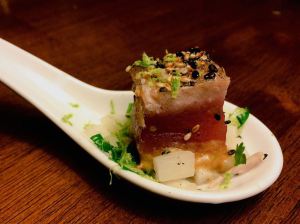
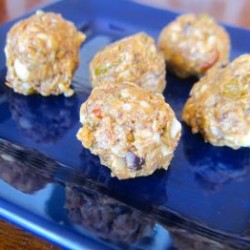
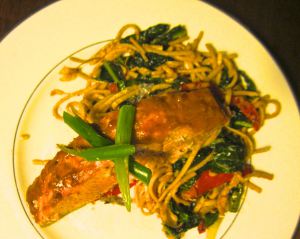
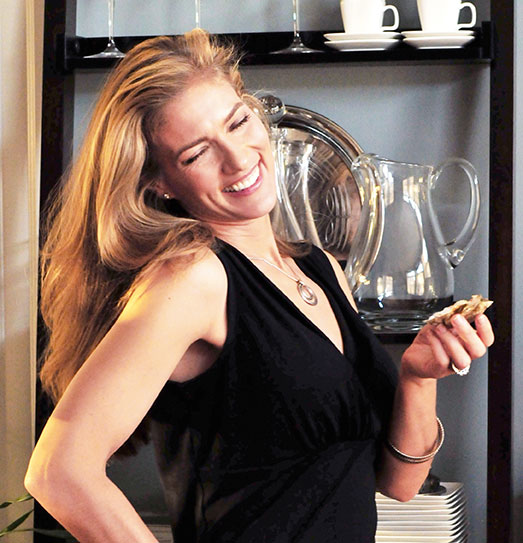
I also adore peanut butter, although i have recently switched to crunchy almond butter. It has a little less fat and I enjoy the flavor!
Sara from http://www.losingtogether.com
Thanks for visiting, Sara! 🙂 There are lots of different butters out there that have unique nutritional profiles, so variety is great. Remember, though, that these are GOOD fats in peanut butter (and other nut butters), so there’s no reason to limit them if part of a calorically balanced diet.
The typical PB I use has about 25% of fat from saturated fats, but the almond butter only has about 12% from sat. fats. They seem to have about the same amount of total fat per serving, but the AB has increased percent of mono and poly unsaturated fats.
Yes, there is, as all foods are a combination of fatty acids as you know – sat, MUFA, PUFA, trans if a ruminant animal or highly processed food – so it’s the proportion that’s important. Peanut butter generally has 2 g of sat fat per 2 tbsp serving, compared to 13 g of unsaturated fats. These are very small quantities of sat fat at this point – a place where percentage is not as informative as absolute quantity given the tiny amounts – and in the scope of your whole diet it’s negligible. As well, a lot of nutrition research shows beneficial effects of whole foods, like peanuts (in this case), and a lot of current research, including my own, moves beyond the “single nutrient” paradigms that have dominated nutrition, which aren’t always helpful due to their reductionistic approach to food. Even sat fat isn’t as bad for you as once thought, for example – but that’s a whole other story.
I’d love to hear more about your research. I have my Ph.D. in exercise physiology and whenever my lab conducted research with nutrition, it was always just one supplement or nutrient at a time. I’ve been reading some interesting research about plant based diets and health, with the main hypothesis being that the saturated fat in animal products is the root cause of several chronic diseases. Have you read any of that type of research?
This is one of my major areas of research, yes, which looks at the role of diets in chronic disease prevention in part by focusing on diets as a whole. A food, and a diet, is greater than the sum of its individual parts, hence reducing things to single nutrients can be misleading and, in this particular case, not very helpful since the focus on this tiny amount of sat fat in this food is clouding the issue. First, there are many, many other elements other than saturated fat that are thought to be responsible for the development of chronic diseases such as heart disease, diabetes, and cancers. Second, sat fat may still play a role, but there are many other critical elements that are risk-promoting, such as trans fats and refined grains, for example, whereas certain types of fat are incredibly heart healthy, such as mono- and polyunsaturated fats found in such foods as olive oil, fish, wine, and nuts – to name but a few. (Likely why in part a Mediterranean diet, which is very high in TOTAL fat but low in sat and trans fat, has found to be protective, although that diet also includes lots of other healthy components due to its plant-based focus.) It’s the TYPE of fat that matters, just as it’s the TYPE of carb that matters, but even beyond fat other key elements to consider are the powerful phytonutrients (fiber, antioxidants, a host of vitamins and minerals) that come from a plant-based diet. You might want to poke around my blog, which touches on some of these issues – the devil’s in the dietary details in particular is one post I wrote that more broadly discusses nutrition. Also, all of my own professional info, including research, publications, and so forth, can be found on my website.
Thank you! I appreciate you taking the time!
A pleasure :).
It is definitely a staple in our house! Great post!
Thanks for visiting, Susie, and for the kind words. 🙂 A staple indeed!
Ok, my nomination for the blog’s most unintentionally mock-worthy sentence fragment of the month:
“While most people think first of red wine as a major source of resveratrol”
Perhaps it might have worked better if an additional qualifier were placed after “most” such as “most nutrition mogels” or “most people who are nothing most people” – you know, that sort of qualifier.
PS I have never heard of resveratrol. And neither has anybody else out here in Normal Land!
Thanks for the reality check, Katy, sorry about that. How’s this: Resveratrol is a powerful antioxidant *that many nutrition geeks slash wine drinkers like me* associate mainly with red wine, since that is its major dietary source. (Red and purple grape juice are also excellent sources, by the way, since this polyphenol is found in grape skins. And, er, peanuts.) The Mayo Clinic has some good info on resveratrol, in case of interest: http://www.mayoclinic.com/health/red-wine/HB00089
PS: You’ve heard of peanut butter, though, right? 😉
Excellent, thanks! And yes, I’ve heard of PB. I was thrilled to see you advocating for something I always thought was bad for me. Next post should be about the merits of Big Macs!
Hee hee. I’m really happy to hear that I’m out of the doghouse for the resveratrol thing, I hope. I must not be completely out of touch, though, since my feeling was that there was still a lot of misinformation about PB out there. (You are definitely not alone in thinking it was bad for you, since there’s still a lot of fear of fat out there but really it’s the TYPE of fat that’s so important for health.) As long as calories are balanced it can be a great part of a heart-healthy diet. Glad it was helpful! That makes me so happy that I might even consider getting out of my pajamas today. 😉
hooray for a nutritionally balanced, plant source of fat and protein! should you ever wish to add some decadence to your toast, PK, try a wee small addition of Nutella… I recognized Nancy Clark’s name – I believe I took one of my online sports nutrition courses at Simmons from her. thanks, PK, for spreading the PB love.
Thanks for the comment, Kate! PB is good stuff indeed. 🙂
Do you have any peanut-alternate suggestions? Daycare doesn’t allow PB and I thought I saw something at a grocery store that was peanut butter that didn’t contain peanuts? Any suggestions for a kid that loves PB?
Hi Jackie, and thanks for visiting! I imagine this is a place where you will need to conduct your own experiments to see what your child likes. There is a huge market for peanut- and tree-nut free products these days, and there are lots of options out there on supermarket shelves/natural food stores and the internet. I recommend googling to check out the wares and then seeing what s/he likes. Sorry I can’t be more helpful here, but I feel hopeful you’ll be able to find something. On http://www.peanutfreeplanet.com, for example, there was a butter made from sunflower seeds that seemed reasonable. My recommendation is to not only go with what your kid likes and what the school will allow – obviously – but to read the ingredients list. The fewer ingredients (generally), the better. Good luck!
This post has changed my life. I love PB almost to the point of obsession. I can’t tell you how many people have told me that it is bad for me and too fattening etc etc. Now I have science on my side and can eat my PB sandwiches (and banana boats, a Mr. Roger’s recipe fave from childhood) GUILT-FREE! Thank you Dr. Newby!
Wow! Thanks for THAT, Bron! What a nice thing to say. I continue to be amazed by the misinformation that is out there. In all fairness, fat was vilified for a long time in the medical (and nutrition) communities, for a number of reasons, but science (and surrounding politics) evolves & we also now know a lot more about the roles of different TYPES of fats in health these days. All fats are not created equal. Fat per se is definitely not “fattening’ – excess of anything beyond one’s caloric needs will lead to increased energy storage in the form of body fat, whether from excess protein, carbs, fat, or alcohol. Fat DOES have more than twice the energy density of carbs and protein, however, so by definition you get a lot more calories for the same weight of food. (Also, high-fat foods are generally very tasty…!) Definitely eat your PB guilt free. Maybe not the whole jar, though. 😉
Great post! I love peanut butter. Someone asked me last week if it could indeed be true that something so delicious could actually be good for you. Haha!
It’s twue, it’s twue! (Any Mel Brooks fans out there reading this?). Thanks for visiting! 🙂
Great post! As a huge peanut butter fan, and representative for the National Peanut Board and America’s peanut farmers, thanks for sharing such great info. Reinforces the messages that I’m working to spread (pun intended!) every day.
Thanks!
Thanks Sherry! This topic has really resonated with people – SO MANY people love peanut butter, and rightly so! – and I’ve been really pleased with the all of the responses, comments, and conversations it’s created. Really appreciate your visiting my blog, and the kind words. 🙂
Interesting, factual post. If it’s not too self-promotional, I’ve written the first book about the history of peanutbutter, which is scheduled to be published by Columbia University Press in November. My website is http://www.creamyandcrunchy.com and my Twitter account is @pbj06.
Thanks for visiting, Jon, and congrats on your upcoming book. People are crazy about peanut butter so I hope it does very well! Cheers, PK (@pknewby)
Just in time….my toddler’s new pre-bedtime ritual is eating peanut butter out of the jar. Which I encourage. And now I have some science to back up my intuition. Thanks! It’s my first time here, and I’m wondering what you think about organic vs. non organic peanut butter…?
Thanks for reading, Lara! Really appreciate your stopping by, and the comment. Glad I could be of help, too! I’d just be careful about the calories about this ritual, but assuming that’s under control PB is a great snack. Short answer is organic products are always better than non-organics. While the nutritional profile (i.e., nutrients, vitamins, calories, etc.) tends to be very similar, organic farming introduces far fewer chemicals into the environment, so choosing organic foods is especially important from the perspective of sustainability. I’ll need to discuss the organic/non-organic issue at some point head on here on my blog as it’s a really important issue. In the meantime, a few other links for you: diet and nutrition in toddlers / links and publications from the USDA and a good resource for thinking about organic vs non-organic produce from the Environmental Working Group is here here. Note that while we don’t know that trace amounts of pesticides found in foods are necessarily problematic for growth and development in children – that would take very long-term research studies that are very difficult and expensive to do – why take a chance if you can avoid it? Definitely better for the environment, potentially better for your kids. The one big caveat? Eating a plant-based diet rich in veggies and fruits likely trumps any risk of pesticides for human health (in doses normal consumed) so if you can’t make organic happen then don’t omit otherwise healthy, non-organic foods from your diet, or your child’s. Oh, and here’s one other link, which is a video that discusses local/organic eating albeit it briefly (video is around 2 minutes & it’s of me at a local farmers’ market here in Boston). Hope this helps? Hard to discuss this one succinctly. 😉 Please visit again!
If I really want to go all out and feel like I’m having dessert, I shave half of a dark Dove chocolate on the PB and toast while it’s warm (you have to act fast not that I’m neurotic or anything 🙂 but it melts to perfection, making it seem like a decadent treat.
Dark chocolate + peanut butter = YUUUUUUUM. LOVE dark chocolate. At that point, do we really need the toast? 😉 (For more context for that comment check out the other chocolate posts on my blog.) Thanks for the visit and the comment, Tracy ~ please visit again! 🙂
Great post! I am a huge fan of peanut butter, but also almond and hazelnut butter. I find a teaspoon at the end of my lunch really fills me up and makes me feel like I had a “treat”.
I only buy nut butter that contains nuts! I’d never seen any other options until I moved to North-America! No need for sugar or salt.. Or even worse, some low fat version.
Thanks for all the work and research you put into this post
You are very welcome. Thank YOU for reading! Yes, all that extra less-than-healthy stuff added is totally unnecessary. Last week I was mentioning on my Facebook page that I recently started seeing other nut butters. Peanut butter probably will always be my true love ;), but I found a great almond and roasted flax seed butter that is superb slathered on apples and on dark rye crisps. I’ve been snacking on that of late. Next up … hazelnut! Thanks for the suggestion!